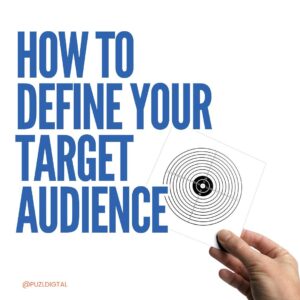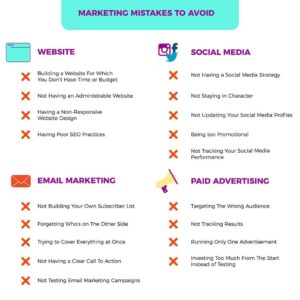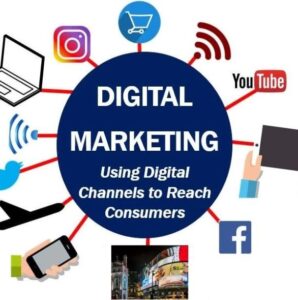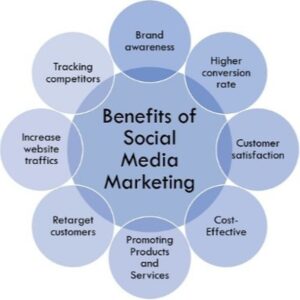Welcome to the world of digital marketing! In today’s age of technology, the Internet has become a vital platform for businesses to connect with their customers. However, with so many businesses competing for attention online, it’s important to have a digital marketing strategy in place. And that’s where a digital marketing strategist comes in.
But what exactly does a digital marketing strategist do? Well, in short, they are responsible for creating and implementing a comprehensive digital marketing plan for a business or organization. This includes everything from social media marketing and search engine optimization (SEO) to email campaigns and content creation.
They work with a team of designers, writers, and developers to ensure that each campaign is executed to perfection. They understand the online behavior of customers and can use this knowledge to develop targeted marketing campaigns that will resonate with their intended audience.
In today’s fast-paced digital world, having a digital marketing strategist on your team is essential. They can help you navigate the ever-changing landscape of online marketing and ensure that your business stands out among the competition.
So, if you’re looking to boost your online presence and reach a wider audience, a digital marketing strategist is the way to go. We’ll cover the importance of having a digital marketing strategist on your team, the key components of a digital marketing strategy, and the tasks performed by a digital marketing strategist.
We’ll also discuss the educational and professional requirements for becoming a digital marketing strategist, examples of successful digital marketing campaigns, and the ROI of digital marketing. By the end of this article, you’ll have a better understanding of what digital marketing strategist does and how they can benefit your business.
What is Digital Marketing Strategy?
A digital marketing strategy is a comprehensive plan that outlines how a business will use digital marketing channels to achieve its goals. It involves identifying the target audience, choosing the appropriate channels, and developing messaging that resonates with the audience.

The key components of a digital marketing strategy include market research, setting SMART goals, choosing the appropriate digital channels, developing a messaging strategy, creating a content plan, and determining a budget. These components work together to create a cohesive plan that can help businesses achieve their digital marketing goals.
Developing a digital marketing strategy is important because it ensures that all digital marketing efforts are aligned with the overall business objectives. Without a strategy, businesses may waste time and resources on ineffective tactics, resulting in a low ROI. A well-executed digital marketing strategy, on the other hand, can help businesses increase brand awareness, generate leads, and drive conversions.
Who is a digital marketing strategist?
A digital marketing strategist is a professional who is responsible for developing and executing successful digital marketing campaigns. They work with a team of designers, writers, and developers to create a cohesive strategy that aligns with the overall business goals.
They initiate, direct, and execute marketing campaigns to speed up lead generation, while also enhancing brand awareness and product adoption are the responsibilities of digital marketing strategists. To achieve the organization’s commercial objectives, they develop the overall plan for both paid and free marketing channels.
A digital marketing strategist must have a deep understanding of digital marketing channels, such as social media, search engine optimization (SEO), pay-per-click (PPC) advertising SEM, web traffic control, email marketing, and content marketing.
They must also possess excellent communication and project management skills to collaborate with team members and stakeholders effectively. By analyzing data and metrics, they can track the success of their campaigns and adjust them accordingly.
They must stay up to date with the latest industry trends and best practices to ensure that their strategies are effective and innovative. A digital marketing strategist plays a crucial role in helping businesses achieve their digital marketing goals and drive revenue.

What Does a Digital Marketing Strategist Do?
A digital marketing strategist is responsible for developing and executing successful digital marketing campaigns that align with the overall business objectives. Their main goal is to generate leads, drive conversions, and increase brand awareness through various digital channels.
Some of the tasks performed by a digital marketing strategist include:
- Conducting market research to understand the target audience and their behaviors
- Developing a messaging strategy that resonates with the target audience
- Identifying the appropriate digital channels to reach the target audience, such as social media, SEO, PPC, email marketing, and content marketing
- Creating a content plan that aligns with the messaging strategy and target audience behaviors
- Setting up and managing digital advertising campaigns, such as Google Ads and Facebook Ads
- Analyzing data and metrics to measure the success of each campaign and make data-driven decisions for future campaigns
- Collaborating with team members and stakeholders to ensure that each campaign is executed to perfection
To be a successful digital marketing strategist, one must have a deep understanding of digital marketing channels and best practices.
They must possess excellent communication and project management skills to collaborate with team members and stakeholders effectively.
In addition, they must be able to analyze data and metrics to measure the success of each campaign and make data-driven decisions for future campaigns.
Digital Marketing Strategist Career Path
The fact that the position of a digital strategist is multifaceted is one of its distinguishing characteristics. It involves numerous marketing positions and teams and calls for a broad range of skills.
A recent General Assembly evaluation of the state of digital marketing revealed a 33% market gap for digital marketing strategy capabilities, which means that 33% of employers are unable to fill their open positions with applicants who have those skills.
That presents an opportunity, particularly for individuals who are familiar with the world of digital marketing.
The following are some similar professional areas that a person with knowledge or training in digital marketing strategy may enter or choose:
- Analytics Manager
- CRM (Customer relationship management) and Email Marketing Manager
- Digital Marketing Manager
- Copywriter
- Web Manager
- PPC Manager
- Brand Manager
- SEO Manager
- Social Media Manager

How to Become a Digital Marketing Strategist
To become a digital marketing strategist, one typically needs a bachelor’s degree in marketing, communications, or a related field. However, many successful digital marketing strategists also have degrees in business, psychology, or data analytics.
In addition to education, experience is also important in this field. Many digital marketing strategists start in entry-level positions, such as social media coordinator or SEO specialist, and work their way up to more senior roles.
The key skills and qualities needed to become a digital marketing strategist include:
- In-depth knowledge of digital marketing channels and best practices
- Excellent communication and project management skills
- Analytical and data-driven mindset
- Creativity and innovation
- Ability to work well under pressure and meet tight deadlines
- Strong problem-solving skills
Other important skills include
Become more familiar with the techniques and tools of digital marketing:
By working for an agency or a business with a digital presence after receiving your bachelor’s degree, you can begin gaining expertise in digital marketing. Aspiring digital strategists frequently begin their careers in entry-level positions like social media manager, and search engine optimization (SEO) specialist.
Develop your analytical abilities:
You must be able to analyze data to understand how it impacts the online appearance of your firm if you want to succeed as a digital strategist.
Sales or marketing teams that you work with may give you details about their efforts and the outcomes they are seeing. This information ought to help you decide what adjustments you need to do to raise the performance of your business.
Recognize user experience and web design:
To make websites that are simple for consumers to navigate, digital strategists collaborate with web designers and developers. Digital strategists can find places where a website could be improved to make it more user-friendly by understanding how the site is built.
For a better understanding of this area of digital strategy, you might want to think about taking coding lessons or creating your websites. To provide a good user experience, you must understand what features users seek out when they visit a website.
Be able to solve problems creatively:
Digital strategists need to be able to solve problems creatively and outside the box. A digital strategist might come up with ideas to make a company’s website more appealing to its target market, for instance, if visitors aren’t turning into customers.
Because they frequently collaborate with other experts such as site designers or content writers, digital strategists need to be creative and able to work well in teams.
Taking online courses
To gain experience and build a career in digital marketing, one can start by taking online courses, attending industry conferences, and gaining practical experience through internships or entry-level positions.
Some popular online courses and certifications include Google Ads, Google Analytics, HubSpot Inbound Marketing, and Facebook Blueprint. Attending industry conferences, such as Social Media Marketing World or Content Marketing World, can also provide valuable networking opportunities and insights into industry trends.
Why Digital Marketing is Important for Businesses
In today’s digital age, having a strong online presence is crucial for businesses of all sizes. Having a strong online presence through digital marketing can provide several benefits for businesses, including increased brand awareness, customer engagement, and loyalty. It can also lead to more website traffic, leads, and ultimately, sales.
Here are some reasons why:
Increased visibility and reach:
With the majority of consumers turning to the internet to research products and services, having a strong online presence is essential for businesses to reach their target audience.
This will also help increase brand awareness by leveraging various channels such as social media, email marketing, and search engine optimization (SEO).

Cost-effective:
Digital marketing can be more cost-effective than traditional marketing methods. For example, social media platforms provide an affordable way to reach a large audience.
One of the primary benefits of digital marketing is that it is more cost-effective than traditional marketing methods. Businesses can reach a larger audience with digital marketing for a fraction of the cost of traditional marketing. This is particularly important for small businesses that may have limited marketing budgets.
Targeted advertising:
Digital marketing allows businesses to target specific demographics, interests, and behaviors, making it more effective in reaching the right people with the right message.
Measurable results:
Digital marketing campaigns can be easily tracked and analyzed to determine their effectiveness, providing businesses with valuable insights that can be used to improve future campaigns.
Another key benefit of digital marketing is that it provides businesses with the ability to measure and analyze their marketing efforts. Digital marketing strategies can be tracked using various metrics, such as website traffic, click-through rates, and conversion rates.
This allows businesses to identify what works and what doesn’t, and make data-driven decisions to optimize their campaigns for better results.
Improve Business Reputations
Having a strong online presence can also improve a business’s credibility and reputation. Customers are more likely to trust and do business with a company that has a professional and engaging online presence.
This can be achieved through various digital marketing channels, such as social media, email marketing, and search engine optimization.
Build a strong online presence: A strong online presence can help businesses establish credibility and trust with their audience.
By creating valuable content and engaging with customers on various digital channels, businesses can build a loyal following and enhance their reputation.
Generate leads and sales:
Digital marketing strategies can be designed to generate leads and sales by targeting the right audience with relevant content and offers.
A digital marketing strategist can help businesses achieve their goals by developing and executing a customized digital marketing strategy that aligns with the business’s objectives. They can help businesses identify their target audience, create targeted campaigns, and optimize their marketing efforts for better results.
What is a Digital Marketing Strategist responsible for?
It’s challenging to pinpoint exactly what a digital strategist’s job entails because it greatly varies depending on the organization that hires you. However, if the digital marketing strategy is going to be your main focus every day, you may anticipate having a lot of duties.

These will rely on the size of your organization, the size of your marketing team, and the requirements of your middle management. As a Jack of all Trades, you would typically be expected to perform numerous tasks, but in organizations with larger marketing teams, you might choose to specialize in a single set.
A digital strategist’s main duties include influencing the following three areas:
SEO
Analyze online traffic and look for chances to boost SEO. Increase traffic to your website and improve your online presence by assisting with the creation of SEO-optimized content. Manage strategies for inbound marketing, PPC, AdWords, and SEO.
Strategy for digital marketing
Create online marketing plans that make use of all available resources and channels, including emails, analytics, social media, and paid media.
Investigate competition efforts and best practices to inform online marketing standards. Identify ways to employ digital technologies to improve the entire marketing plan.
Brand administration
Implement several frameworks for increasing brand equity and value. Evaluate a brand’s alignment with the strategic objectives of the organization regularly.
Determine which digital marketing communication methods will be most effective in expressing your brand’s distinct value proposition.
What makes a great digital strategist?
The attributes of an excellent strategist can be easily achieved via concentrated personal development and discipline. A competent Digital Strategist has a thorough understanding of digital marketing, social media platforms, and tactics for improving the overall business and sustaining success.
A Digital Strategist should be analytical and creative, with strong research and communication abilities. A skilled digital strategist combines these characteristics with a professional curiosity and quest for information about the world around them. Here are some qualities that make a great Digital strategist:
Pose as a counselor
As a strategist, you aid a company, group, or individual in problem-solving. A smart strategist is like a good therapist; they are self-aware, perceptive, and never intrusive. They focus more on you than on themselves. A strategist must engage in “counseling” to gain the insights necessary to produce the ultimate strategy.
Critical thinker
Another quality of a great digital strategist is, being a critical thinker. They prefer to take in information, work independently, and then bring ideas to the team.
They may spend a significant amount of their time in silent reflection but are by no means hermits. The customer sits back and listens when a strategist stands up to speak because they are knowledgeable, engaging, and self-assured.
However, they are crucial for creating a successful digital proposition because of their singular ability to combine knowledge from throughout a marketing team.
Awareness
Your campaign team should include a strategist who is aware of the requirements, both professional and personal, of each participant. He should be able to use data, original thinking, and consumer research to come to conclusions. In team meetings, the strategist must act as the “voice of reason,” listening, reassuring, and holding back overconfidence—even in their superiors.
Empathy
is a vital characteristic of a competent strategist; the capacity to put oneself in the shoes of another. If a strategist cannot put himself or herself in the shoes of the consumer, they will be unable to successfully transmit the demands of the brand or organization to them.
Benefits of Hiring a Digital Marketing Strategist
Hiring a digital marketing strategist can provide numerous benefits for businesses of all sizes. Here are some of the key benefits:
- Increased brand awareness: A digital marketing strategist can help businesses increase their visibility and reach on various digital channels, such as social media, search engines, and email marketing. This can result in higher brand awareness and recognition among the target audience.
- Improved lead generation: By developing and executing targeted digital marketing campaigns, a digital marketing strategist can help businesses generate more leads and conversions. This can lead to increased revenue and growth.
- Better customer engagement: Digital marketing strategies can be designed to engage customers at every stage of the customer journey, from awareness to purchase and beyond. This can lead to increased customer loyalty and retention.
- Measurable results: Digital marketing campaigns can be measured and analyzed to determine their effectiveness. A digital marketing strategist can use data and analytics to optimize campaigns and improve ROI over time.
Examples of successful digital marketing campaigns include the Old Spice “The Man Your Man Could Smell Like” campaign, which used humor and viral marketing to increase brand awareness and sales, and the Dove “Real Beauty Sketches” campaign, which used emotional storytelling to engage and empower women.
Digital marketing can provide a high return on investment (ROI) for businesses. According to a study by HubSpot, businesses that prioritize digital marketing are 2.8 times more likely to experience revenue growth compared to those that don’t.
The ROI of Digital Marketing
Return on Investment (ROI) is a critical metric for businesses to measure the effectiveness and success of their marketing efforts. Digital marketing has become an increasingly popular and cost-effective way for businesses to generate leads, increase brand awareness, and drive sales.
The ROI of digital marketing can be measured through various metrics such as conversion rates, click-through rates, website traffic, and social media engagement. Digital marketing provides a measurable ROI, unlike traditional marketing methods which are difficult to measure.
A digital marketing strategist can help improve ROI by creating and executing a data-driven digital marketing strategy that aligns with the business’s goals and objectives. They can help businesses identify their target audience and create targeted campaigns that reach and engage the right people. They can also help optimize campaigns through continuous testing and analysis, resulting in better ROI over time.
Investing in digital marketing can provide several benefits for businesses. It can lead to increased brand awareness, higher search engine rankings, and more website traffic. It can also help businesses reach their target audience more effectively and generate more qualified leads. Additionally, digital marketing is generally more cost effective than traditional marketing methods, making it accessible for businesses of all sizes.
In conclusion, digital marketing has become an essential part of any modern business strategy, and a digital marketing strategist can help businesses achieve their marketing goals while improving ROI. By investing in digital marketing, businesses can increase their reach, generate more leads, and ultimately drive sales and revenue growth.
Conclusion
In conclusion, digital marketing is an essential component of modern business strategy. It provides businesses with a platform to reach a wider audience, build their online reputation, and generate leads and sales.
A digital marketing strategist plays a vital role in developing and implementing a digital marketing strategy that aligns with the business’s goals and objectives. By leveraging their skills and expertise, they can help businesses achieve better ROI and stay competitive in the market.
To succeed in today’s digital age, businesses must prioritize digital marketing and work with a qualified digital marketing strategist to develop and execute an effective strategy. By doing so, they can achieve their marketing goals, increase their ROI, and stay ahead of the competition.


